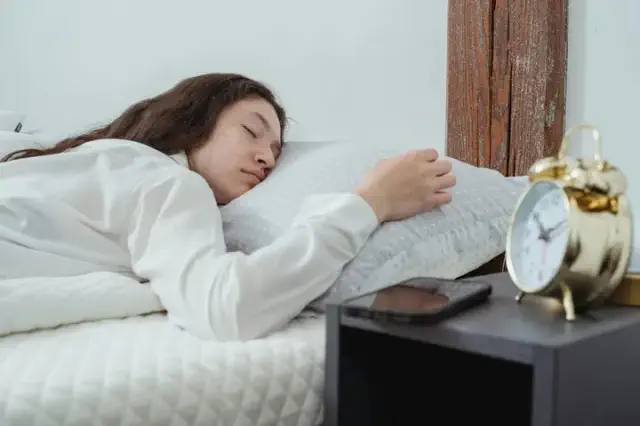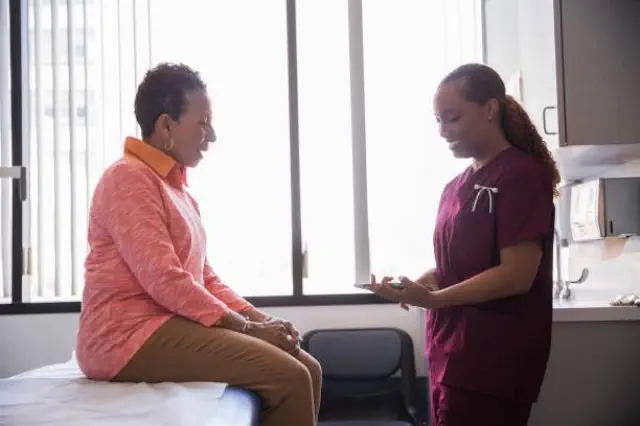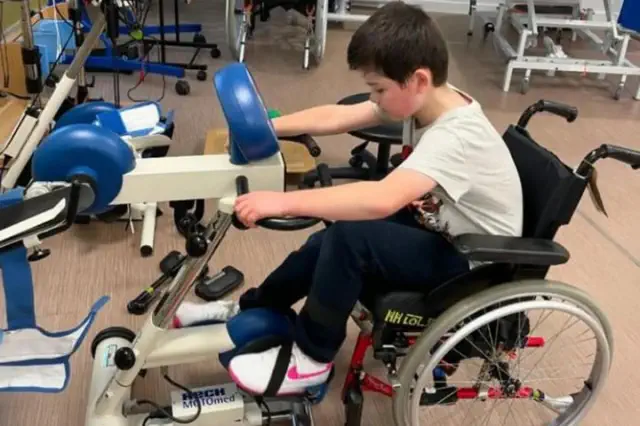
Here’s What REM Sleep Is and How to Determine If You’re Getting Enough of It
Achieving sufficient sleep can be challenging, yet it is crucial for your overall health and wellness. View pictures in App save up to 80% data. According to a sleep survey by YouGov conducted in 2024, around 38% of Brits say that they ‘rarely’ feel well-rested after a night’s sleep, and this is particularly prominent in people between the ages of 35 and 54. Of course, to many of us it is hardly news that we’re not sleeping as well as we should be and getting a full night’s restful sleep is a rare treat but getting enough sleep is essential. This is especially true, according to the experts at The Sleep Foundation, for REM sleep. According to The Sleep Foundation's website, "REM plays a crucial role in various essential functions, including brain development and the processing of emotions." So, what is REM sleep? REM is an acronym for 'rapid eye movement', and it is in this phase of sleep that we frequently experience dreams. Harvard Health explains: “REM sleep is when most of your dreams occur. During REM sleep, your heart rate, blood pressure, brain activity, and breathing increase. "Even with your eyes shut, they dart around quickly. Meanwhile, the muscles in your arms and legs become momentarily paralyzed, stopping you from physically acting out your dreams as you live through them." This is also a time that our brains are really getting to work. According to the sleep and rest experts at Calm, REM sleep helps with these essential cognitive functions: Enhances learning and memory Supports emotional regulation Cultivates creativity and problem-solving Contributes to brain development Improves mental health When it comes to essential functions, these appear to be quite crucial. How to determine if you're achieving sufficient REM sleep and ways to increase it. According to Healthline, if you’re aged 18–60 and are sleeping for 7–8 hours per night but are not waking up feeling refreshed, you may not be getting enough deep sleep, which enables REM sleep. Health specialists suggest implementing these measures if you suspect you aren't receiving adequate REM sleep: Practise strategies to manage stress Establishi sleep routines, such as a bath before bed Sleep in a quiet, darkened room with a comfortable temperature Use an eye mask to block out light Exercise for 20–30 minutes during the day but not within the last few hours before bedtime Avoid large meals, caffeine, nicotine, and alcohol close to bedtime Do relaxation exercises or meditation Get up and doing something, such as reading, if you can’t sleep Leave distractions, such as phones and other devices, outside the room Wishing you a night filled with pleasant dreams! Assistance and guidance: Mind, open Monday to Friday, 9am-6pm on 0300 123 3393. Samaritans offers a listening service which is open 24 hours a day, on 116 123 (UK and ROI - this number is FREE to call and will not appear on your phone bill). CALM (the Campaign Against Living Miserably) offer a helpline open 5pm-midnight, 365 days a year, on 0800 58 58 58, and a webchat service. The Mix is a free support service for people under 25. Call 0808 808 4994 or email [email protected] Rethink Mental Illness offers practical help through its advice line which can be reached on 0808 801 0525 (Monday to Friday 10am-4pm). More info can be found on rethink.org.

Alert Regarding Suicide Risk Associated with Antidepressants Following the Passing of Thomas Kingston
A senior coroner has warned that there is a lack of communication over the 'risks of suicide' associated with anti-depressants following the death of royal family member Thomas Kingston - who ended his life after reacting to his medication. Mr Kingston, whose marriage to Lady Gabriella at Windsor Castle in 2019 was attended by the late Queen, died by suicide after he shot himself in February of last year. An inquest into the 45-year-old's death was told he had recently been experiencing anxiety and when he took his life, had not long stopped taking antidepressants prescribed by a Buckingham Palace doctor. Although he exhibited symptoms, the financier had not indicated any thoughts of suicide, and Gloucestershire coroner Katy Skerrett noted that his 'intent is still uncertain' due to the 'negative effects of medications he had been prescribed recently'. In a recent report aimed at preventing future fatalities, Ms. Skerrett, the senior coroner for Gloucestershire, expressed worries about the sufficiency of communication concerning the suicide risks associated with these medications. In delivering a verdict of suicide, she raised concerns about whether the existing recommendation to 'continue' the medication is 'suitable' in situations where the person is experiencing 'negative side effects'. While spending the weekend with his parents in Kemble, a town in the Cotswold area of Gloucestershire, the businessman made the tragic decision to end his life. After having lunch with them, on February 25, he began to load his car and prepared to return to London. View pictures in App save up to 80% data. An inquest revealed that Thomas Kingston (left), the spouse of Lady Gabriella Windsor (right), tragically took his own life due to a negative reaction to prescribed medication. View pictures in App save up to 80% data. Thomas Kingston (left) seen alongside Lady Gabriella Windsor during their wedding at St George's Chapel on May 18, 2019. View pictures in App save up to 80% data. Queen Camilla, King Charles III, Lady Gabriella Windsor, and Thomas Kingston enjoy the races from the Royal Box on the fifth day of Royal Ascot 2023. Ms. Skerrett stated that around 5pm to 6pm, Mr. Kingston 'took a shotgun out of his car, which he had just borrowed from his father for a shooting event.' "She continued, 'He then entered an extension connected to his parents' home.'" 'In a locked bathroom, he inflicted a gunshot wound to his head, resulting in injuries that were not compatible with life.' The ex-negotiator was later discovered by his father and was declared dead at 6:54 PM by the police, who stated that there were no suspicious factors related to his passing. The coroner stated, "Mr. Kingston ended his life with a shotgun, resulting in a significant traumatic injury to the head." 'The intentions are still ambiguous since the individual who passed away had been experiencing negative side effects from medications he had recently started taking.' The inquest revealed that he had been 'recently facing anxiety' but had 'not indicated any thoughts of self-harm'. According to reports, Mr. Kingston was prescribed sertraline, an antidepressant, along with zopiclone, a sleep aid, after he expressed difficulties sleeping due to work-related stress. View pictures in App save up to 80% data. Mr. Kingston (shown in the image), had gone to visit his parents in Kemble, located in the Cotswold area of Gloucestershire, for the weekend when he tragically chose to end his own life. View pictures in App save up to 80% data. In June 2023, Mr. Kingston enjoyed the races from the Royal Box at Ascot, where he was joined by Queen Camilla. View pictures in App save up to 80% data. Lady Gabriella and Thomas Kingston posed for official wedding photographs, with the late Queen and Prince Philip seated to their right on this special occasion. According to reports, both individuals received prescriptions from a general practitioner at the Royal Mews Surgery, a medical facility located at Buckingham Palace that serves the staff of the royal household. Mr. Kingston came back to the clinic expressing that he wasn't experiencing any improvement, prompting his doctor to switch his medication from sertraline to citalopram, which is a comparable medication. Reports indicate that in the days prior to his passing, he had recently ceased his use of anti-depressants that were prescribed to manage his symptoms. Following his passing, the coroner has expressed concerns that without intervention, there may be a potential risk for others to experience similar fatalities linked to the issues surrounding anti-depressants. The coroner raised concerns about the sufficiency of communication regarding the suicide risks linked to selective serotonin reuptake inhibitor (SSRI) medications. "She also mentioned that it's important to consider whether it's advisable to continue with SSRI medication or to transition to a different SSRI, particularly if no positive effects have been observed and/or if any negative side effects are present." A report aimed at preventing future fatalities has been submitted to the National Institute for Health and Care Excellence, the Medicines and Healthcare Products Regulatory Agency, and the Royal College of General Practitioners. Every organization must submit their response by March 3. Following the tragic passing of Mr. Kingston, Buckingham Palace issued a statement honoring him as an 'extraordinary individual' who 'brought joy and brightness to everyone who had the privilege of knowing him'.

New Clinical Trial Evaluates Cell Therapy for Newborns Affected by CMV
Newswise — An innovative clinical trial has commenced at Children’s Hospital Los Angeles, focusing on a groundbreaking approach for newborns affected by congenital cytomegalovirus (CMV): the application of virus-specific T-cell therapy. The phase 2 randomized trial signifies a potentially revolutionary method for addressing congenital CMV in infants, a condition that can result in hearing impairment, developmental issues, vision problems, and other complications. While antiviral drugs are the prevailing treatment option, they often come with significant adverse effects. CHLA stands out as one of only four centers nationwide—and the sole provider on the West Coast—offering this innovative trial. “Congenital CMV can have devastating impacts that can affect a child’s entire life,” says Philippe Friedlich, MD, MSEpi, MBA, Chief of Neonatology and Co-Director of the Fetal and Neonatal Institute at Children’s Hospital Los Angeles. “The hope is that cell therapy can offer a safer and more effective treatment option for these babies.” Utilizing a mother’s immune system CMV is a prevalent virus that typically does not produce symptoms in individuals with robust immune systems. However, around 1 in every 200 infants contracts the virus while in utero, and among those, about 20% may experience birth defects or enduring health issues. The clinical study aims to recruit 30 infants under the age of one month diagnosed with moderate to severe congenital CMV. The participants will be randomly divided into two groups: the first group will be treated with standard antiviral medication, either valganciclovir or ganciclovir, while the second group will receive a combination of standard antiviral therapy along with CMV-specific T-cells. The CMV-specific T-cells will be sourced from a donor who shares a partial match with the patient: the infant's mother. “If a baby has congenital CMV, then obviously the mother will be infected because transmission was in utero,” says Neena Kapoor, MD, Director of the Transplant and Cell Therapy Laboratory at Children’s Hospital Los Angeles. “The goal is to harness the mother’s immunity and give it to the baby.” At CHLA, the trial is a collaboration between the Cancer and Blood Disease Institute and the Fetal and Neonatal Institute. Dr. Kapoor currently participates in similar studies testing virus-specific T-cells in children undergoing bone marrow transplant who contract CMV. “Although it’s still in the experimental phase, we’ve seen promising results with this method in transplant recipients,” she explains. “Our goal is to determine whether it can serve as an effective therapy for newborns suffering from congenital CMV.” A small quantity of cells According to the protocol, mothers will initially undergo screening to verify the presence of T-cells that generate gamma interferon when exposed to CMV. If the mother qualifies as a suitable candidate, the team gathers a more substantial sample of her blood cells and transports it to the Transplant and Cell Therapy Laboratory at CHLA. In this facility, the T-cells that generate gamma interferon to combat CMV are separated electromagnetically from the other components of the blood. A specialized machine then processes these cells within a mere two days. The infant receives a small amount of CMV-specific T-cells through an intravenous infusion. This is followed by another dose administered every two weeks until the infection is resolved. A maximum of five infusions will be provided. Dr. Kapoor explains, "The concept is that these T-cells, which have already been trained to identify and eliminate CMV, will multiply within the baby's system and combat the infection." While the mother is merely a half-match for the child, administering a small quantity of interferon-producing cells is expected to reduce the likelihood of the baby experiencing graft-versus-host disease, she notes. Additionally, infants are carefully observed for any indications of cytokine release syndrome. “Dr. Kapoor mentions that while we haven't observed cytokine release syndrome in transplant recipients treated with CMV-specific T-cells, it remains a possible risk. Therefore, we closely monitor infants.” Timely detection is crucial. Dr. Friedlich emphasizes the significance of early identification of CMV in newborns by physicians to prevent potential irreversible harm. Key indicators to monitor include: Enlarged spleen or liver Elevated liver enzymes Microcephaly (small head) Hearing loss Participation in the trial is limited to patients who are under 28 days old. “We aim for cell therapy to effectively manage the infection at an early stage, which will help reduce the risk of hearing loss and neurodevelopmental issues,” he explains. He mentions that this trial has the potential to pave the way for more sophisticated personalized medicine solutions for seriously ill newborns. Dr. Friedlich remarks, “In the realm of neonatology, we haven't fully embraced personalized medicine and cell therapy yet. I believe this represents the next significant advancement in our specialty and a chance to profoundly impact the lives of our patients.”

"My son believed he would conquer the tumor and regain his ability to walk."
Family pamphlet/PA Real Life View pictures in App save up to 80% data. Harry Goulden started his physiotherapy shortly after undergoing surgery to remove his tumor. Miriam Fine-Goulden stated, "The moment he learned it was a tumor, he resolved that it was a challenge he could conquer and believed he would walk again." Her athletic son, Harry Goulden, who resides in Hampstead Garden Suburb in north London, experienced a sudden paralysis from the chest down one morning as a result of a rare spinal tumor. Ms. Fine-Goulden portrays the 10-year-old as a vibrant child who enjoys playing football and spending time with his twin brother, Jesse. However, on October 9th, he unexpectedly began to experience pain in the back of his neck. "She mentioned that he skipped football practice and was unable to sleep due to the pain that was troubling him." When he opened his eyes the following morning, he found himself unable to move and felt completely powerless in his legs. Family pamphlet/PA Real Life View pictures in App save up to 80% data. Harry's mother characterizes him as an active young boy with a passion for football. Harry and his mother rushed to A&E at Evelina London Children's Hospital where an urgent MRI scan revealed a rare tumour the size of a walnut growing on his spine. It had also formed a blood clot, impacting his movement from the chest down and they were informed he may "never walk again". Ms. Fine-Goulden recalled, "When I initially learned that he wouldn't be able to walk again, my first thought was, 'Alright, this is how his life will unfold.'" He was subsequently transported to King's College Hospital in a pediatric specialist ambulance, where he underwent an urgent surgical procedure on his spine to extract the blood clot along with a significant portion of the tumor. Family pamphlet/PA Real Life View pictures in App save up to 80% data. The tumor had rendered Harry's legs powerless prior to its removal. The mass was found to be non-cancerous, and samples were dispatched for additional analysis to assess the likelihood of recurrence in the future. Harry's mother expressed that she felt "extremely anxious" when he woke up one morning and discovered he couldn't move his legs. However, after learning that the issue was due to a tumor requiring surgery, he resolved to be optimistic, stating that he was determined to recover and walk again. "She added that he felt a sense of relief once he understood what it was, but I believe he was quite anxious before that clarity." Family pamphlet/PA Real Life View pictures in App save up to 80% data. Ms. Fine-Goulden mentioned that her son underwent almost six weeks of physiotherapy. Dr. Bassel Zebian, the neurosurgeon consulting for Harry at King's, mentioned that in the past decade, they have encountered only a "small number" of young individuals with comparable tumors. "He mentioned that Harry was diagnosed with a unique case of Diffuse Leptomeningeal Glioneuronal Tumour." "The tumor was located high in Harry's spinal cord and had caused bleeding, leading to a loss of function from the chest downwards." He mentioned that they needed to take swift action to provide him with the greatest opportunity to regain his ability to walk. Harry completed an intensive three-and-a-half weeks of physiotherapy at King's, followed by an additional two weeks at a specialized rehabilitation facility in Stanmore, north London, which has significantly aided his recovery and helped him regain his mobility. Family pamphlet/PA Real Life View pictures in App save up to 80% data. According to his mother, Harry defied expectations with the speed of his recovery. Ms. Fine-Goulden, a consultant in pediatric intensive care, described it as a gradual journey: "He started by standing up, then progressed to walking with a frame, and eventually moved on to using crutches." "He managed to walk on his own after five and a half weeks." Harry's mother described his recovery as "extraordinary." Family pamphlet/PA Real Life View pictures in App save up to 80% data. According to Ms. Fine-Goulden, the 10-year-old has returned to his normal self after three and a half months. "Ms. Fine-Goulden remarked that no one anticipated his rapid and successful recovery, not the surgeon, nor the neurologist, nor the physiotherapists – yet he proved them all wrong." "His immense self-belief and confidence played a significant role in his success."

As a general practitioner and a survivor of bowel cancer, I prioritize my gut health through a carefully curated diet. Here’s a glimpse into what I consume to enhance my digestive well-being.
View pictures in App save up to 80% data. Anisha prioritizes her well-being, yet she still indulges in chocolate and occasionally savors a gin and tonic - Christopher Pledger for The Telegraph. In the kickoff of our exciting new series, Dr. Anisha Patel, a 44-year-old general practitioner, author, and survivor of bowel cancer, discusses how she incorporates healthy foods into her busy lifestyle. Total calories: 0kcal Rise and shine! My alarm goes off at 6.30am every day. That’s when the whole house (my husband and two children, aged 12 and 13), wake up. They’re out the door for work and school by 7.30am. I also use this time to exercise prior to my working day, whether that’s weights, going for a walk or run or doing some Pilates. Initial beverage: 0 calories I have a glass of water on my bedside table and the first thing I do is sit on the edge of my bed and drink it, so I start hydrating early. Over the course of the day, I’ll have at least two litres of liquids, mostly tap water but I do love sparkling as well – and the odd mug of herbal tea or a diet fizzy drink. Coffee break: 120 calories Around half an hour later, I’ll have my first coffee of the day, which I make using our bean to coffee machine – a recent investment. I usually have a latte with oat milk (120 calories). Breakfast: 398 kcal View pictures in App save up to 80% data. Breakfast consists of boiled eggs and oatcakes for a quick meal, or overnight oats topped with seeds for a more leisurely option. After undergoing surgery for bowel cancer, I’ve found it helpful to eat my meals within a narrow window, as it’s better for my gut to have a rest. I eat breakfast between 8am and 9am, after I’m back from a run, swim or weight training. If I’m working, I opt for boiled eggs which are the best transportable breakfast and are great if you’re short on time. I boil them the night before and grab two of those (150 calories), a couple of oat cakes (90 calories), some fruit and a handful of plain, non-salted mixed nuts (158 calories) – I love pecans, cashews, almonds and Brazil nuts. It’s a balanced option that keeps me full. When I have breakfast at home, I like to prepare overnight oats using almond milk, chia seeds, and a mix of sunflower and pumpkin seeds. I usually add a drizzle of honey or a spoonful of peanut butter, along with some fresh or frozen fruit on top. The kids really enjoy it! It's super simple to make and perfect for busy mornings – just toss everything into a jar, screw on the lid, and let it sit in the fridge overnight. Mid-morning treat: 150 calories I don’t always have a morning snack but if I do, it will be something like nuts (150 calories). I have four packets in my desk drawer. I only keep healthy snacks in there, like peanut butter, so I can bring in crackers or celery crudités if I get hungry. Meal: 670 calories View pictures in App save up to 80% data. Anisha often makes a salad for lunch using the leftover items she has in her refrigerator. I usually take my lunch break from 12:30 PM to 1:30 PM, either in the staff room or at my desk. To minimize food waste, I often eat leftovers. For instance, today I had some chili from last night (420 calories), paired with a little rice (200 calories) and cottage cheese (50 calories). This combination is quite trendy right now, but I appreciate it mainly for its high protein content, which keeps me satisfied for a longer period. When I'm not enjoying leftovers, I focus on batch cooking. Like many others, my schedule is quite hectic, so I dedicate about an hour in the evenings or on weekends to whip up containers of salad. I whip up a hearty bowl using Merchant Gourmet grains, lentils, or chickpeas, mixing in whatever ingredients we have on hand – like tomatoes, cucumber, pomegranate, a drizzle of extra virgin olive oil, and some cottage cheese or feta. It’s packed with nutrients, polyphenols, and antioxidants. Additionally, it proves to be more cost-effective, as it reduces food waste and allows for the incorporation of a greater variety of plant-based foods like vegetables, whole grains, fruits, herbs, spices, and nuts. This approach is optimal for nurturing your gut microbiome and enhancing both mental and physical well-being. If I find the time, I'll go for a 10-minute stroll during lunch to get some fresh air. Sugar rush: 192 calories View pictures in App save up to 80% data. Kiwis make for an excellent snack due to their combination of fiber. I always have some fruit at 4pm. I’m a big fan of kiwis. They’re great for gut health as they’ve got a mix of soluble and insoluble fibre. So I’ll have a couple of those (68 calories) and something else, like an orange, grapes or dried mango (41 calories). In the doctor's office, there's a constant supply of chocolate, biscuits, and snacks. Like many others, I have a fondness for chocolate and the occasional bag of crisps. While I don't indulge in these treats daily, when I do, I typically choose a chocolate digestive, which contains 83 calories. Evening meal: 617 calories View pictures in App save up to 80% data. Dinner options typically include dishes such as chili and curries (on the right), while for protein, Anisha prefers chicken, paneer, or halloumi (on the left). I frequently find myself quite hungry by the time I arrive home, so I try to have dinner with the kids at 5:30 PM. However, there are days when we don’t sit down to eat until 7 PM. My husband usually comes home from work a bit later, but he joins us for dinner about half the time. This evening, we're enjoying a Chinese stir fry for dinner. To streamline things for when I return home, I spent 10 minutes this morning prepping by chopping pak choi, bell peppers, onions, mushrooms, and broccoli, which totals 617 calories. Some of my favorite meals include lasagna, chili, curries, and homemade pies. For protein, I usually choose chicken, turkey, fish, red meat (only once a week), paneer, or halloumi. I make sure to incorporate lots of spices and herbs into my cooking. We also enjoy pizza once a week. Delicious dessert: 157 calories During the weekend, we enjoy homemade pudding, which is typically prepared by the kids. However, on weekdays, we opt for two pieces of fruit along with Yeo Valley kefir or Sainsbury’s Greek yogurt (101 calories). I love dark chocolate and not just for the health benefits. I will have one square of a minimum 70 per cent bar every night after dinner to settle my sweet tooth (56 calories). I’m not fussy on the brand but usually go for Lindt or Green & Black’s. I typically stop eating after having my piece of dark chocolate around 7pm. However, there are some exceptions to this rule, like on weekends or when dining out, when I might indulge in a later snack. I usually hit the hay by 10pm, and occasionally even as early as 9:30pm. Getting enough sleep is important to me, so I aim for around eight hours each night. Evening drink: 52 calories I typically avoid alcohol during the week, reserving it for social occasions on the weekends. My go-to choices are a gin and tonic, which has about 52 calories, or a glass of sparkling wine. Since my stomach isn't fond of alcohol, I make sure to enjoy it in moderation, never going over 14 units a week. I truly appreciate the one or two drinks I indulge in from time to time. As recounted to Emily Craig. Subscribe to the Front Page newsletter at no cost: Your vital resource for the day's schedule from The Telegraph, delivered straight to your inbox every day of the week.

Effective remedies for cold sores: The best treatments that have been proven to work
View pictures in App save up to 80% data. Cold sores can be a frustrating and uncomfortable experience, but they’re incredibly common and usually nothing to worry about health-wise. The tiny, fluid-filled blisters usually show up around the lips and mouth and generally clear up on their own within about a week, making them more of a cosmetic concern than a medical one. However, what triggers these outbreaks, and what strategies can you use to manage or prevent them? Cold sores are small, painful blisters that typically appear on or around the lips and are caused by the herpes simplex virus (HSV). They are highly contagious and can be triggered by factors such as stress, illness, or sun exposure. Cold sores usually heal on their own within a week or two but can recur periodically. Cold sores are primarily caused by the herpes simplex virus, most commonly HSV-1. After an initial infection, this virus remains in your body for life, remaining inactive until certain triggers occur. These triggers can include stress, fatigue, hormonal fluctuations, or even environmental factors like sunlight or cold temperatures. "Cold sores are a common viral infection that, while unsightly and uncomfortable, typically clear up on their own within seven to 10 days," says Phil Day, superintendent pharmacist at Pharmacy 2 U. "Outbreaks can happen when the virus is reactivated by triggers like stress, being run down, or even physical injury to the area." Here are some methods to treat cold sores: 1. **Over-the-counter creams**: Use topical antiviral creams, such as docosanol (Abreva), to help speed up healing. 2. **Oral antiviral medications**: Prescription medications like acyclovir or valacyclovir can be effective, especially if taken at the first sign of an outbreak. 3. **Pain relief**: Over-the-counter pain relievers, such as ibuprofen or acetaminophen, can help alleviate discomfort. 4. **Cold compress**: Applying a cold, damp cloth to the affected area can reduce swelling and provide relief from pain. 5. **Avoid triggers**: Identify and avoid factors that trigger outbreaks, such as stress, sunlight, or illness. 6. **Keep the area clean**: Gently wash the sore with soap and water to prevent infection. 7. **Moisturize**: Use lip balm or a soothing ointment to keep the area hydrated and prevent cracking. 8. **Avoid picking**: Refrain from touching or picking at the cold sore to prevent spreading the virus. Always consult a healthcare professional for personalized advice and treatment options. Although there is no definitive cure for the herpes simplex virus, there are several effective methods to handle cold sore flare-ups and alleviate discomfort: Essential Information About Cold Sores Phil Day emphasizes several important points: Here are some helpful tips to prevent cold sores: 1. **Avoid Triggers**: Identify and stay away from personal triggers such as stress, fatigue, or sun exposure that may lead to an outbreak. 2. **Use Sunscreen**: Apply lip balm with SPF when outdoors to protect your lips from the sun's harmful rays. 3. **Maintain Good Hygiene**: Wash your hands frequently and avoid touching your face, especially your mouth and eyes. 4. **Avoid Close Contact**: Steer clear of close contact with someone who has an active outbreak, and do not share utensils, towels, or lip products. 5. **Manage Stress**: Incorporate stress-reducing activities like yoga, meditation, or regular exercise into your routine. 6. **Stay Hydrated**: Drink plenty of water to keep your body and skin hydrated. 7. **Consider Supplements**: Some people find that taking lysine supplements can help reduce the frequency of outbreaks. 8. **Healthy Diet**: Maintain a balanced diet rich in vitamins and minerals to boost your immune system. 9. **Consult a Doctor**: If you frequently experience cold sores, speak with a healthcare professional about preventive medications. By following these tips, you can reduce the likelihood of cold sore outbreaks. Prevention typically entails recognizing and steering clear of your triggers. Day suggests: When to consult a healthcare professional Typically, cold sores will heal without intervention; however, there are certain situations where it’s advisable to consult a healthcare provider: Cold sores can be quite bothersome, yet they are a frequent occurrence for many people. By utilizing appropriate treatments and taking preventive steps, you can minimize both the frequency and intensity of these outbreaks. As Phil Day notes, "Keep in mind that cold sores are a widely prevalent issue, and there are numerous effective treatment options to assist in managing outbreaks." Our testing methodology The ES Best Shopping desk takes a thorough and practical approach to compiling our recommendations. We consulted trusted friends and family members who have firsthand experience with cold sores, analysed genuine user reviews, and vetted the most effective solutions. A close friend of mine, who hasn't had much luck in her romantic life, experienced her first cold sore following her initial kiss. Since then, she has been dealing with recurring outbreaks during winter or when stressed. Through her experiences and candid input from others, we were able to identify the most effective products and techniques for managing cold sores. This combination of hands-on testing and thorough research guarantees that our guide is both trustworthy and relatable. Quick Overview of Effective Cold Sore Relief Options Continue reading for our suggestions. View pictures in App save up to 80% data. Ruling Zovirax Cold Sore Cream Aciclovir 2g stands out as the best for its affordability and effectiveness in treating cold sores. The inclusion of aciclovir, a clinically proven antiviral agent, ensures it actively targets the virus responsible for cold sores, helping to reduce both the severity and duration of outbreaks. Its fast-acting formula provides quick relief from discomfort, making it a reliable go-to when you feel that familiar tingling sensation. The 2g tube is designed for convenience, making it simple to apply directly to the targeted area without the hassle of messy packaging. Its effectiveness is most notable when used at the initial signs of an outbreak, as it can help stop the cold sore from progressing and promote faster healing. If you're looking for an affordable solution that provides quick relief and effective results, this cream checks all the boxes.